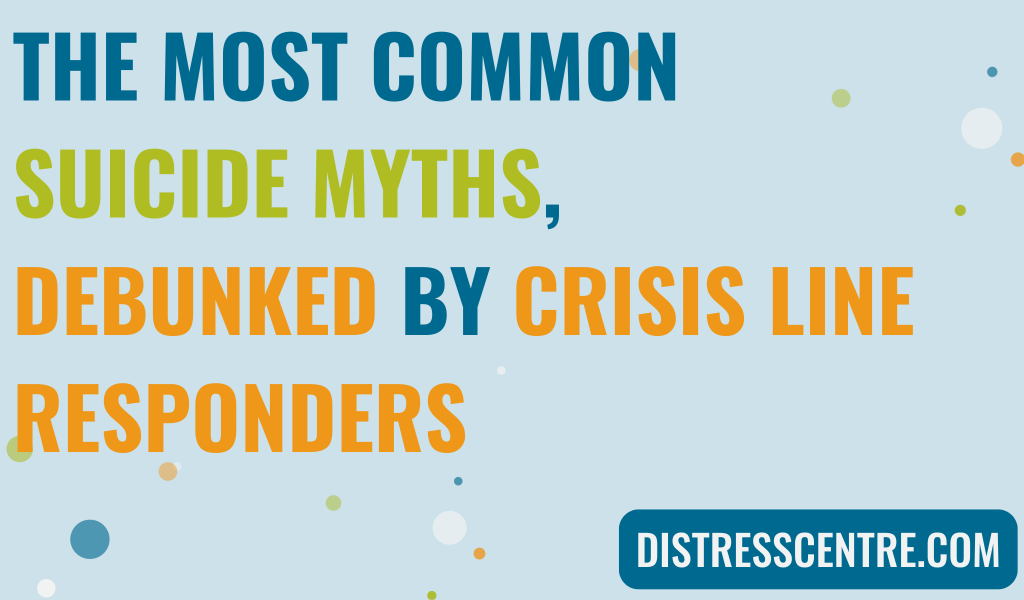Talking about suicide is never easy, and because it’s so difficult, myths and misunderstandings have taken hold. These myths can feel convincing on the surface, but they are harmful. They keep people from reaching out for help and prevent others from knowing how to respond.
At Distress Centre Calgary, our 988 Responders , Crisis Line Responder Volunteers and Contact Centre Coordinators hear these myths every day. They see the harm they cause, but they also see the hope that comes when people learn the truth and feel safe talking about suicide.
Myth 1: “Talking about suicide can cause suicide.”
This myth comes from the idea that if you bring up suicide, you are introducing it as an option. It suggests that silence is safer than asking directly.
Asking someone if they are thinking about suicide does not put the thought in their head. Asking someone directly about suicide signals to them that it is a safe topic to discuss and can provide a huge sense of relief. It is a difficult subject to bring up and by asking, you take the burden off the person in crisis, who may be afraid to speak up, due to the stigma that still surrounds the subject (Centre for Suicide Prevention).
Sofia, a 988 Responder, shares:
“If you think someone is sad, not acting like themselves, or maybe depressed, there is probably a good chance they are already thinking about suicide. Asking will not put the thought in their head. It shows them you care and that they are not alone.”
Myth 2: “People considering suicide only want to end their life.”
This myth comes from the idea that people who are suicidal are locked into their decision and that nothing can change their mind. It suggests that support will not matter and that once someone has decided, there is no other way forward (988 Canada).
The truth is that most people who think about suicide do not actually want to die. What they want is to end their emotional pain. Suicidal thoughts often happen in overwhelming moments of crisis, and with the right support, those moments can pass.
Shachie, a Contact Centre Coordinator, explains:
“People usually express suicidal ideation during moments of crisis. With the right supports from centres like Distress Centre Calgary, they are able to go on and live very fulfilling and meaningful lives.”
Myth 3: “People who take their own lives are selfish, cowardly or weak.”
This myth comes from the belief that suicide is a reflection of character. It assumes that people who die by suicide are thinking only of themselves (988 Canada).
The truth is that suicide is about unbearable pain, not selfishness or weakness. People who die by suicide often feel trapped and hopeless and see no other way out . Suicide is the result of extreme emotional suffering, not a lack of strength.
Christina, a 988 Responder, explains:
“Suicidal ideation is not about weakness or selfishness. It is about pain. People can feel very trapped in their circumstances and see death as the only way out. But you do not have to carry that weight alone. There are people who can help lighten it.”
Myth 4: “People who talk about suicide are just seeking attention.”
Since asking for help is so stigmatized, talking about suicide can be dismissed as an attempt to get attention. It assumes that people who speak about suicide do not truly mean it (Centre for Addiction and Mental Health).
In truth, suicide is so stigmatized and difficult to talk about that people rarely bring it up casually. Speaking about suicide is an important and sometimes lifesaving act. Everyone deserves to talk about their emotions and ask for help. Not talking about it creates far more harm than speaking up.
Hannah, a Contact Centre Coordinator, says:
“What is so bad about attention? Everyone deserves to talk about their emotions and get the support they need. Sharing what you are going through should not be hidden. It is important and lifesaving.”
Why These Myths Are So Harmful
Each of these myths deepens the silence around suicide. They make people less likely to speak up when they are in crisis, and they make others less likely to reach out when they notice someone is struggling.
When we challenge these myths, we create room for honesty and connection. We show people that their pain matters, that their life matters and that help is always available.
How to Seek Help
If you are struggling or worried about someone you know, support is available 24/7.
Call our 24-Hour Crisis Line at 403-266-HELP (4357)
- Text us at 403-266-4357
- Chat with us online at distresscentre.com
You can also call or text 988 to connect with Canada’s Suicide Crisis Helpline and speak with a trained responder.
If you are a youth, you can contact ConnecTeen by calling 403-264-TEEN (8336), texting 587-333-2724, or chatting online at calgaryconnecteen.com.
For information and referrals to community, social, health and government services, call or text 211, or visit ab.211.ca.
You are not alone. Reaching out for help is a powerful step, and support is always here.

